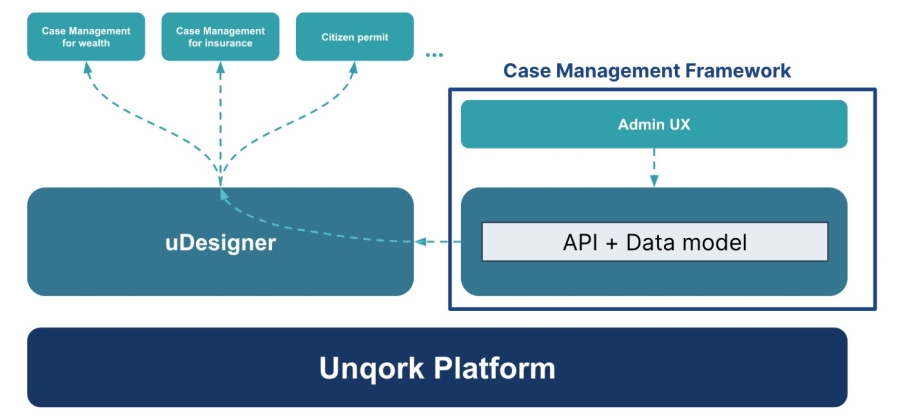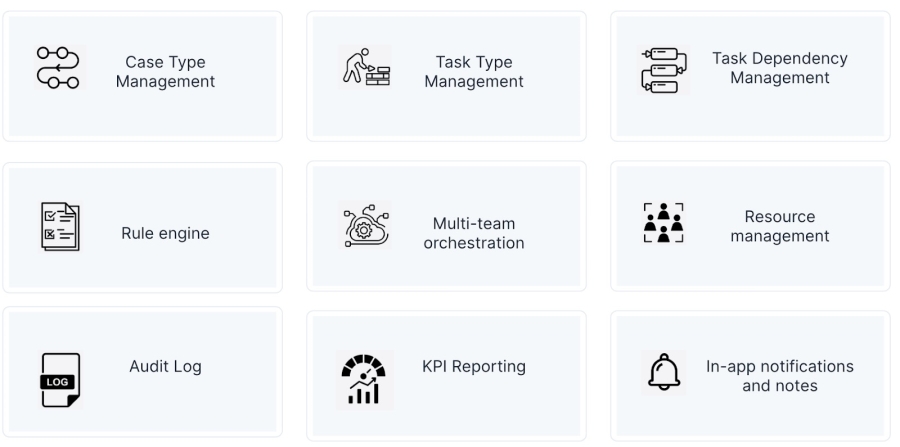Case Management FAQ
Overview
This article explores the most frequently asked questions for Unqork's Case Management Solution. Learn about how to follow best practices, the ways the Case Management Solution can accelerate you business needs, and all the customizable features that come with it.
General
In this section you'll explore the most commonly asked questions about how Unqork's Case Management Solution works, when you should use it, and how it can accelerate your business.
-
EAP (early access program): 2/26
-
FCS (first customer ship): 4/8
Unqork's Case Management Solution is a package you can install that extends the Unqork platform's functionality. You can use this package to streamline the creation of Case Management applications. The package includes a set of APIs APIs (application programming interfaces) are a set of protocols and definitions developers use to build and integrate application software. APIs act as the connective tissue between products and services., a Data Model, an Admin UI The UI (user interface) is a device's end-user interaction and communication point. It can include display screens, keyboards, and mouse. It is also how a user interacts with your application. tool, and a sample case management application.
Unqork's Case Management Solution supports all traditional case management use cases. In particular, it supports:
-
Case Type and Task Type Management: Supports unlimited case and task types to define your business processes. Each case type includes custom tasks and data elements.
-
Rule Engine: Lets you control the flow of a case.
-
Audit Logs: Records all changes to a case in an audit log.
-
Multi-Team Resource Management: Supports unlimited team and user creation for case work collaboration.
-
Notifications: Supports email and in-application notifications.
-
Case Management APIs: Supports 40+ APIs to execute all basic case management functionality.
-
Case ManagementData Model: The preconfigured Data Model allows for customizable fields to match the client’s business needs.
-
Sample Case Management Application: Use this template to help you explore custom applications.
-
Admin UI: Business users can define their own case and task types without adjusting implementation.
-
UDesigner: The Case Management Solution is integrated into UDesigner's Module Builder for easy development and customization.
-
Faster development and higher-quality applications: Accelerate application development and reduce errors by reusing preconfigured and commonly tested functionality.
-
User-friendly customization: Define your case and task type workflows using an intuitive UI that non-technical users can customize. A drag-and-drop interface lets Creators Also known as Unqork Users, or Designer Users; is anyone who is inside the Unqork platform. access all data and API elements, eliminating the need for complex data mapping.
-
Easily maintain and upgrade: Create future-proof applications that are easy to manage without having to update them. Doing so lets you focus on innovation instead of maintenance.
All internal and external data is secured using Unqork’s best-in-class security standards. All integrations will maintain the highest security standards.
-
Increase development speed with reusable components: The Case Management Solution comes ready to use and provides the most common case management functionality.
The development process focuses on the following:
-
Mapping the business processes to task and case types.
-
Customizing the UI.
-
Customizing the sample front-end application to meet the requirements for each client.
-
-
Easily configure using a UI-based Admin setup: Tailor case types to meet the unique business processes for each client. Defining the business processes is done using the Admin UI or its APIs.
The Case Management Solution lets you define the following:
-
Custom case types.
-
Custom task types.
-
Multi-level case-type categories.
-
Task dependencies.
-
SLAs (service level agreements).
-
Rules for task sequencing and branching.
-
Handles the orchestration of tasks across multiple users and teams.
-
-
Easily customize your solution with UDesigner: Clients requiring application customization can access all data components and APIs directly in UDesigner. Use the drag-and-drop interface to create a custom case management application, minimize errors, and reduce development time.
-
Easily update and maintain your solution: The Case Management Solution does not require any complex installation. You can easily deploy it in any environment, extending the functionality of the Unqork platform. It can also be updated seamlessly when new versions are available.
Once the Case Management APIs are promoted, clients can enable Case Management in a workspace using the following process:
-
Open the UDesigner platform.
-
Navigate to a workspace.
-
Open the Workspace Settings.
-
Set Case Management to (ON).
Once Case Management is enabled, it cannot be disabled.
-
Highly customizable: Effortlessly define case and task types to model different business processes.
-
Reduces technical debt: Integrate into an existing system without having to replace, rebuild, or write complex code.
-
Business and IT collaboration: Eliminate data and process silos by creating a user-friendly ecosystem for business and IT clients.
Technical
In this section, you'll explore the current limitations of the Case Management Solution, what occurs when updates are made, and how RBAC RBAC (Role-Based Access Control) is a method to control system access for authorized users. The role in RBAC refers to the levels of access employees have to a network. is handled.
Yes, data is encrypted both at rest and in transit. At rest, data is encrypted using a top-level encryption key and a multi-level key hierarchy.
The Admin UI and the components are only available in English. But, the case worker case management application can be built in any language.
No, they are not accessibility compliant by default.
It depends on the type of update. If you change the name of a task, it does not create a new version. If you delete a task from a case type, it does create a new version. The update only affects new cases, not cases that are already complete or in-progress.
Below are the supported changes and whether they'll create a new version in your Case Management Solution:
| Type | Allowed | New Version |
|---|---|---|
|
Adding a required metadata field to a case type. |
Yes |
Yes |
|
Adding a metadata field that is not required to a case type. |
Yes |
No |
|
Editing the name of a metadata field. |
Yes |
No |
|
Deleting a metadata field. |
Yes |
Yes |
|
Changing a category of a case type. |
No |
No |
|
Rearranging the task sequence of a case type. |
Yes |
Yes |
|
Adding a task to a case type. |
Yes |
Yes |
|
Deleting a task from a case type. |
Yes |
Yes |
|
Changing the name of a case type. |
Yes |
No |
|
Changing the default priority. |
Yes |
No |
Currently, case and task types must be manually created in the Admin UI.
Yes. Tasks with the same sequence number are executed in parallel.
Yes, we will couple UDesigner platform releases with Case Management releases.
Yes, Case Management runs on Vega. It should not impact your building experience. The Case Management APIs are built in Centauri because Vega does not currently support remote executes. The Case Management framework is an Express View application built on Vega runtime. The Case Management Solution is currently a standalone product that does not impact what Creators Also known as Unqork Users, or Designer Users; is anyone who is inside the Unqork platform. might be building in UDesigner.
-
You cannot currently delete case and task types.
-
You cannot currently enforce SLAs.
-
You cannot currently add case annotations.
-
You cannot currently escalate a case to your case manager.
-
Notifications are not currently supported.
-
Advanced rules, like branching, are not currently supported.
-
Audit logs are not currently supported.
-
KPIs A quanitifiable measure of performance of a specific objective for a specified time. are not currently supported.
The initial user is an SSO user. They'll create a user for themselves in the Case Management application. Then, moving forward, they will use their Case Management login credentials. Admin users are Designer Creators use Deisgner View to build and manage modules in the Unqork Designer Platform. users while case workers and case managers are Express Express View is how your end-user views your application. Express View also lets you preview your applications to test your configuration and view the styling. This is also the view your end-users will see when interacting with your application. After configuring a module, click Preview in the Module Builder to interact with the module in Express View. users.
It currently does not, but it will be available soon. Currently, the case manager can reassign cases when considering a case worker’s workload. Our solution does not consider when a case worker is out of the office. Tasks are accepted by case workers and are not automatically assigned.
Yes, only if the update generated a new version of that case type.
Yes, only if the update does not generate a new version of the case type.
The Case Management Solution supports the following RBAC RBAC (Role-Based Access Control) is a method to control system access for authorized users. The role in RBAC refers to the levels of access employees have to a network. roles:
-
Administrator: Has the same permissions as a case manager, but can also create case types, task types, users, teams, and customize notifications.
-
Case Manager: Has the same permissions as a case worker, but can also reassign tasks and receive escalations from case workers.
-
Case Worker: Can only accept and complete tasks.
Yes, we provide a View Case Type functionality in the Admin UI.
You only retrieve the next task in the queue. Available tasks depend on your team and its priority. High priority tasks are higher in the queue than lower priority ones.
You can have multiple Case Management Solutions in your environment, with multiple administrators. User Management functionality is currently under development.
Currently, all the logic is defined by the administrator. The case worker must work with the logic and sequence of events already defined.



